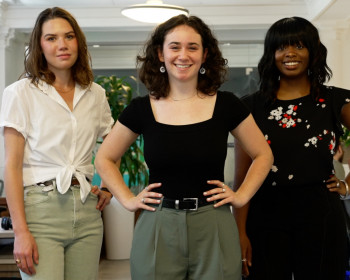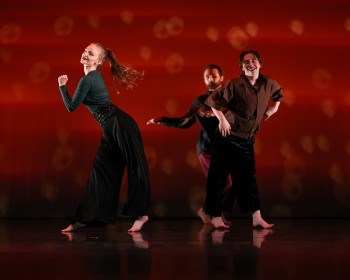Summer science research: Students seek greater understanding of drinking behaviors
Open gallery

At Lewis & Clark, the lazy days of summer are anything but. Devoting 40 hours a week to rigorous scientific research, an elite group of students perform collaborative research with faculty each summer.
Three students are working alongside Associate Professor Yueping Zhang, chair of the psychology department, to conduct research on the psychological influences affecting college students’ drinking behaviors. Senior psychology majors Iris Kemp, Theresa Hennings, and Hilary Galloway have spent their summer considering the social, psychological, and neuropsychological dimensions of their research question in the interest of creating better prevention and intervention strategies for reducing drinking-related problems.
“It’s so clearly important because it’s about the day to day life of people,” said Galloway.
This is the second year that the Rogers Summer Science Research program has supported projects in psychology. Learn more about the study of drinking behaviors and the implications of the group’s research in this podcast (mp3).
About the program
The John S. Rogers Science Research Program allows students to participate in graduate-level research with an emphasis on strengthening their communication skills by requiring presentations of their findings. This summer, 40 students are pursuing topics that range from nanoparticles to neuromodulators, and binary stars to drinking behaviors. Working closely with peers and faculty members, students undertake research questions and present their work in two public venues.
“We’re not asking you anymore, ‘What’s the answer,’ we’re saying ‘What’s the question,” said Michael Broide, director of the Rogers Program and chair of the physics department. “I think what sets our program apart is that regardless of what project you are on, we’re all going to come together as a group to present what we’re doing in as accessible a way as possible. In science, it’s such an important skill to be able to explain cogently what you’re doing.”
In this podcast (mp3), learn more about the history of the program and hear what it offers students, faculty, and the community at large.
Students make their final research presentation at the Rogers Summer Science Poster session. Scheduled for September 16, the poster session is free and open to the public.
*Senior Emily Stevens produced these podcasts.
Public Relations is located in McAfee on the Undergraduate Campus.
MSC: 19
email public@lclark.edu
voice 503-768-7970
Public Relations
Lewis & Clark
615 S. Palatine Hill Road MSC 19
Portland OR 97219

